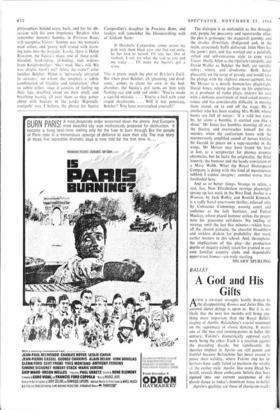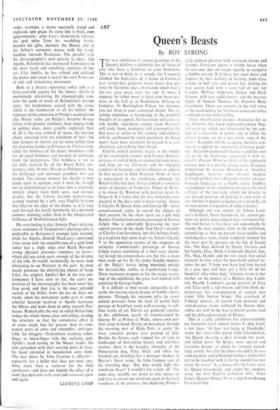A God and His Gifts
BALLET ATER a six-week drought, hardly broken by the disappointing Romeo and Juliet film, the autumn dance deluge is upon us. But it is un- likely that the next few months will bring any- thing more important than the Royal Ballet's staging of Apollo, Balanchine's crucial statement on the supremacy of classic dancing. It marks one of the two real turning-points in ballet this century, Fokine's diametrically opposed early work being the other. Each is a reaction against the preceding decade, but significantly the theories implicit in Apollo are still potent and fruitful because Balanchine has never ceased to prove their validity, where Fokine and his in- heritors have sadly failed to maintain the vitality of the earlier style. Apollo, like some Dead Sea Scroll, reveals those embryonic beliefs that have ripened into our current acceptance of the classic dance as today's dominant force in ballet.
Apollo's qualities are those of classicism itself: order, restraint, a theme succinctly stated and explored, and grace. Its story line is brief, even
epigrammatic: after Leto's modernistic labours, the god spins from his swaddling bands, masters his gifts, instructs the Muses, and at his father's summons moves with his hand-
maidens towards Parnassus. The parallel with the choreographer's own activity is clear: like Apollo, Balanchine has instructed Terpsichore in the most lucid and ennobling exercises of her art. Like Apollo, he has refined and civilised the dance and taken it nearer his own Parnassus of rich and stimulating movement.
Both as a theatre experience today and as a forty-year-old augury for the future, Apollo is enormously interesting. Its choreography con- tains the seeds of much of Balanchine's present style: the harmonious accord with the score, which is the foundation of all his ballets; the rightness of his extension of Petipa's academicism (the Muses' solos are Petipa's Sleeping Beauty fairies with grander attributes than singing birds or golden vines, more grandly explored). Best of all is the easy control of space, the massive effects obtained with the minimum of fuss—the four dancers in Apollo are far more telling than the churning hordes in Presages or Choreartium, while the boldness of the dance inventions calls for an equal boldness and mastery of technique from the interpreters. This boldness is not as yet fully realised by all the Royal Ballet per- formers; only Monica Mason as Polyhymnia has the brilliance and unforced grandeur that are needed. The correct manner for Apollo is very much open to opinion; cool it must be, though not so dehumanised as to lapse into a solemnity entirely absent from both score and choreo- graphy, but the Covent Garden performance seemed touched by a soft, very English lyricism that blurred the edge of the dance, as if it were seen through the pearly luminosity of a northern summer morning rather than in the unequivocal brilliance of Mediterranean light.
My own feeling is that Annette Page's delicate, clean statement of Terpsichore's choreography is preferable to Beriosova's stronger lyric manner, while for Apollo, Donald MacLeary's emotional force (even with the encumbrance of a gold lame tunic) has a slight edge over Keith Rosson's strong physical presence—tunicless, to boot— which did not catch quite enough of the divinity of the role. (It would, incidentally, be more than interesting to see Nureyev in the part: he most nearly possesses the electrifying impact of Serge Lifar, the original Apollo.) But in the two per- formances I have seen so far, the cast's ex- position of the choreography has been never less than good, and they rise to the most splendid section of the ballet, from the pas de deux on- wards, when the movement seems part of some celestial theorem resolved as Apollo harnesses the Muses and leads them in unity towards Par- nassus. Remarkable the way in which Balanchine makes the whole theme clear and telling, shaping the structure so that the cumulative effect is of some single fact far greater than its com- ponent parts of solos and ensembles; unforget- table the imagery—Terpsichore standing index- finger to index-finger with the reclining god; Apollo's head resting on the Muses' hands; his arm garlanded with their curving ports de bras; his hand extended in benediction over them. The new decor by John Craxton is efficient— especially for a ballet that does not need any- thing more than a staircase for the final apotheosis—and does not impede -the effect of a work that demands to be seen and savoured again and again.
CLEMENT CRISP















































 Previous page
Previous page